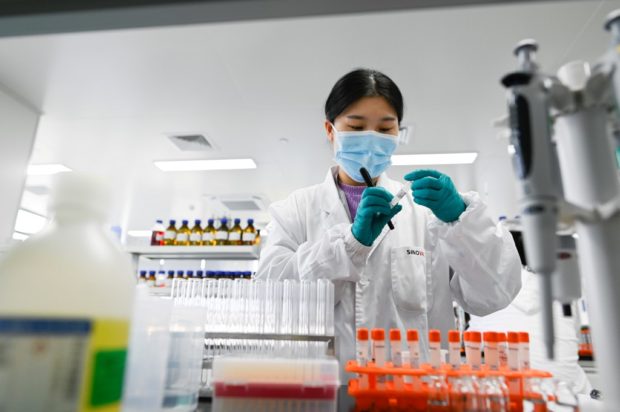
An engineer works in the general laboratory during a media tour of a new factory built to produce a COVID-19 coronavirus vaccine at Sinovac, one of 11 Chinese companies approved to carry out clinical trials of potential coronavirus vaccines, in Beijing on September 24, 2020. (AFP)
MANILA, Philippines— The Senate will look into possible legal options available to the Philippines if the reported secret program by the United States military against China’s Sinovac Covid-19 vaccine in the Philippines is proven true.
This, and the effects of the alleged clandestine campaign against Sinovac will be covered by a Senate probe being pushed by Sen. Imee Marcos.
Marcos herself will lead the probe as head of the Senate committee on foreign relations, as proposed in Senate Resolution No.1052 she filed on Tuesday.
“There is a need to verify if indeed the anti-vax and misinformation campaign was orchestrated by the U.S military,” Marcos said in her resolution.
If proven true, she said, the alleged anti-vaccination and misinformation campaigns “gravely threaten national security issues and public health.”
“In the affirmative, there is a need to determine the ramifications of the actions of the U.S. military, any potential breach of international law by the United States of America, and the possible legal recourse available to the Philippines, considering that such anti-vax and misinformation campaign [threaten] national security,” she said.
The alleged campaign by the US military against China’s Sinovac inoculation was reported by Reuters last June 14.
The secret campaign, according to the report, was supposedly a “payback” for China’s efforts to blame the US for the pandemic.
The Philippine government launched a vaccination drive using Sinovac’s CoronaVac vaccine on March 01, 2021 in a bid to combat Covid-19.
Before the roll-out of the Sinovac vaccine, however, there were numerous posts on social media platforms that “cast doubt on the efficacy and safety of such vaccine,” according to the resolution.
“Many of these posts even claim that the Sinovac vaccine is fake,” it said.
The measure also pointed out how these social media posts “sowed mistrust” against the Sinovac vaccine and other Covid- 19 vaccines as shown by the low vaccination rate in the early phases of the vaccination roll-out.
This led then president Rodrigo Duterte to threaten that those who refused vaccination may face arrest, the resolution further noted.
“The effort to fuel fear about Chinese inoculations risked undermining overall public trust in other government health initiatives, including U.S.-made vaccines that became available later,” Marcos said.

